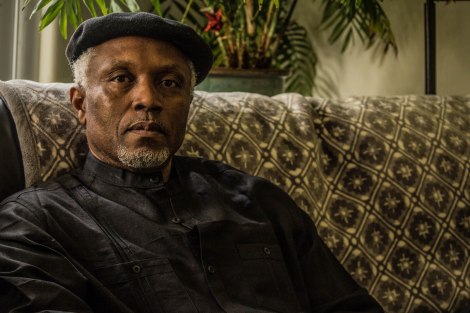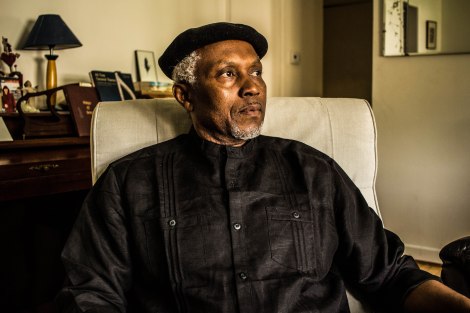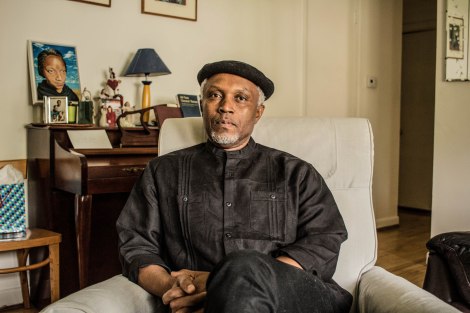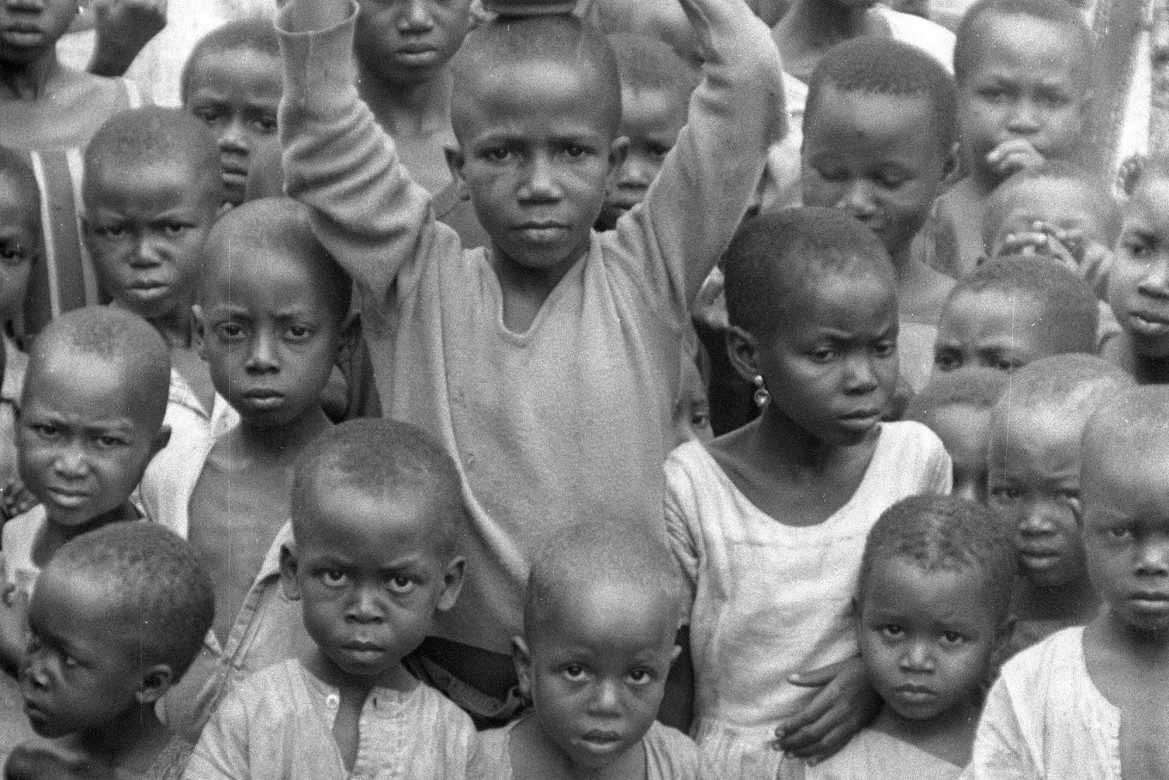
Okey Ndibe remembers the Nigerian-Biafran War. Photo by Darcy Hughes.
What comes to mind is sheer terror, the constant and incessant appearance of military jets, Nigerian military jets that would just show up with little notice and at all hours to drop their deadly bombs and the sense, um, one got as a child, that basically death was around the corner. The rattling on buildings because the jets flew pretty low as they strafed surroundings and the cackle of bullets, of guns in the distance at night and then the boom of tanker fire, of military tanks. So, those, I would just summarize it as sheer terror.
…It seems to me that there was, there’s no other word for the feeling that one had, you know. You saw fear in the eyes of your parents, which was fear for their own lives, fear for the lives of their children, uh, so life was terribly disquieted, ehm, and so you walked around terrified because sometimes in the daytime, when these jets, military jets appeared, you could see the bombs as they fell from the sky and then you heard that sort of huge sound that they made as they detonated and so there is nothing, I think, that there is little more terrifying in life than that kind of experience.
…sheer terror
I was born in 1960. Well, I, we moved around, my parents and my four siblings. The youngest was born during the war in 1968 and so we moved around first from my hometown, where we originally returned to a town called Ezinifite to Ihiala and then ultimately to Onitsha at the end of the war. As the war advanced, we kept moving out of its way.
Well, we were, it was again the sense of being unsettled that you could move to a place and stay there for a few weeks and then the war advanced. As Nigerian soldiers came closer, you had to with your parents and with other uncles and aunts, we moved together some of the time. There was an elderly woman who was my father’s aunt, who was with us. And she actually died during the war. And so it was my parents and my siblings and I, so five of us, five siblings, I have four siblings, so there were five of us, you know, and then my parents, so seven and then some cousins and uncles and their families, who were also often part of this constant relocation to relatively safer zones.
We never stayed in relief camps. We found homes, you know, which- the first place we moved, Ezinifite- we stayed with the family of a woman who was my mother’s friend and classmate in teacher training school, so we stayed with their family. Subsequently, when we moved to other places we rented typically a room. So all seven of us would be packed in one room because there wasn’t much accommodation at all, so people sacrificed and people just gave refugees, as we were called, a room. Sometimes we were lucky to get two rooms. But often I remember just staying in one room with a kind of a cloth divider dividing where my parents slept and where the kids, five of us, slept and sometimes joined by my cousins as well.
…we were running for our lives
We never stayed in a refugee camp until after the war when we were in Onitsha, that’s when we stayed in a camp and I’ve written about this in an essay called My Biafran Eyes so everywhere we were during the war, we stayed in a home with the exception of Onitsha where we stayed in a massive camp for refugees.
As a child, one’s understanding of the war is basically Gowon, as well as the Northerners, were out to get us. There were a lot of military songs that were popular and those songs basically derided Gowon [Yakubu] and proclaimed we were fighting a just war for our freedom. My youngest brother, as I said was born during the war, and he was given two names that I think spoke volumes. One name was Oguejiofor, which means “a just war.” The other one was Osondu, which means “a race for one’s life.”
You know, we were running for our lives. And so, ehm, the sense that I got was somehow that we were besieged by this terrifying force called federal troops. All Nigerian troops in radio broadcast, I was drawn to the radio because my father would listen to the radio every morning, every morning as he shaved, and so I can’t say that I had a very intelligent discern in the sense of what the war was about except that somehow these terrible people hated us and were out to get us and we were in a valiant struggle for our own liberation and safety.
…big heads with their vacant eyes
I was one of the fortunate ones because I didn’t suffer from what they call kwashiorkor, that condition. Even so, I know that I was skeletal, course we didn’t have, in a sense you don’t have, you know, an image of yourself as a child. During the war I didn’t have an image of myself but I had an image of the other kids who had kwashiorkor and so clearly there was very little food to be had and we hunted lizards and I had a cousin who was good with his catapult and he would sometimes kill lizards or kill small birds and we would roast them and eat. And so yes there is a picture of me after the war where I was clearly emaciated, but um, someone would say that I lost weight from maybe the robust healthy kid that I was before the war.

Okey Ndibe. Photo by Darcy Hughes.
Kwashiokor was frightening because of the, sort of the grotesque appearance from the kid who suffered from, you know. You saw their bloated stomachs and their big heads with their vacant eyes that seemed sunken. Their hair was you know, discolored, you know, sort of, discolored hair, and it looked sometimes as if their head was too large for the neck that was terribly tiny and they didn’t have clothing on. Their legs just seemed like spikes, you know. So it was a very, very terrifying picture of humans.
Constantly [I feared for my life]. As I said, the aircraft military jets would appear and at all hours, you know. And so one had to, at short notice, you know, scamper the banana leaves or some other, maybe some bunkers and just lay on the ground, you know. And I remember, which I recall one occasion when I went out with my siblings to fetch firewood and as we were doing this, the jets appeared, and we, of course we crashed to the ground, and we were looking at it and we saw a huge bomb as it was dropping rapidly and we heard the boom of its detonation and it seemed to us that it was, we were sure that it was over the home where we lived at the time and so we were terrified that we would return home and find that our parents had been killed. But when we returned, we saw that our parents were safe but the bombs had dropped at a market that was also near a school, where we went to school during the war.
So such sense of danger that on several occasions you know just walking with our parents, we see cars that were burnt to cinders because they’d been caught by the strafing jets and yeah so one was constantly afraid because images of death were all over the place and sometimes you overheard parents trying to whisper about some relative who had died on the war front. Some relative or somebody they knew who had died.
That was my father’s aunt who passed away during the war.
There were relatives who died, um, during the war but I didn’t know this until after the war. There was a close relative who went into the war and he sustained a gunshot to the left, to his right hand, and so he still carries- he is still alive- and he carries that injury to the right hand even today.
…images of death were all over the place
After the war, we ended up coming from Ihiala, where my father worked in the post office for Biafra and we managed to find– basically hike– to Onitsha, which happened to be my mother’s hometown. Her relatives’ homes had been destroyed, had taken a hit. We were all camped in this open field, which I don’t know the location now but the image is so vivid- a huge open field with what looked to me like thousands of tents and that’s where all of us slept and once or twice every day the soldiers- Nigerian soldiers would become victorious- would give food to people at the camp.
And there would be a lot of fighting, jostling by the men. Women couldn’t compete and children of course, were, it was out of the question. So it was mostly men who would go and stand in line and fight it out and push and shove, and if they were lucky, they got a little bit of food.
Often they got nothing, and that was for me a turning point because I met, a woman summoned me, who was a girlfriend or maybe a wife to one of the soldiers and said she liked my eyes and would I be her husband. Of course I was very shy and I began to look on the ground and to draw with the toe my, toe on the ground and then she said you want food? I said yes. She went out and got me a small basin and she put in beans and rice and canned tomatoes and the like and she gave me a little Nigerian coin, which became the first currency that my parents had after the war and so frequently, subsequently she would provide food for me and so my father was spared the anguish of joining the food fights.
… Well, how I will respond to this [claims from some people that Biafrans did not suffer during the war as some have suffered in other wars in other parts of the world throughout history] is this would be an instance of profound ignorance, or really, morbid mischief.
A war in which more than two million people died, most of them children from starvation and women, not soldiers. Anybody who tries to minimize the grief and the misery and the suffering in that war, would either be historically ignorant, ignorant of the history of that war, or if they are aware of the history, then they must have a morbid sense of mischief so that would be, you know, I can’t even imagine somebody who would make that claim, you know.
There is no question in my mind that the particular tragedy of Nigeria -and I’ve written about this also- that Nigeria is haunted by the memory of Biafra, that it is the refusal to learn the proper lessons from Biafra that has continued to consign Nigeria to the margins of what is possible, given the country’s potential and so we still have a very fractious sense of the war and people want to jump in and say okay, the Igbos are wrong. They wanted to divide the country, and eh, you know. Or the Igbos staged a 1966, January ’66 coup and this precipitated it, and of course on the side of the Igbo, some people just say it was a problem of Northern hate. We need a nuanced understanding of that war and we need to confront the memory of that war and our refusal and indeed our reluctance and indeed, refusal to do that, I think, has kept Nigeria in the ghastly shape that it is today.
Well, there is an official, first of all, the, Nigeria, like other countries that have fought a war, Nigeria doesn’t have an official, doesn’t have the sense to create monuments and museums that would preserve some of the memory of that war, okay. The fact that there was, in Asaba, for example a whole scale massacre of men and boys, by federal troops. Nigeria has not confronted that genocide. This is not fighting a war, fighting a battle where soldiers die. This was a callous slaughter of men and boys that happened in Asaba, right? So, that is talked about in universities abroad. There is a university, University of Southern Florida, has held several conferences about that Asaba massacre, but there is no Nigerian university that I am aware of that has done a systematic study. I am not aware that there are universities in Nigeria, ok, that have contemporary Nigerian history that looks at the war, right? And so I think that there is a sense that after the war that Nigerian government quickly said it’s “no victor, no vanquished.” It is almost as if they said let’s file this under this catch phrase of “no victor, no vanquished” and we’ll move on as if nothing happened. It is important to look at what happened and for me, I am open…to even look at the ways in which perhaps Biafrans were complicit in bringing about the war, right? But we can’t get to that unless we have an honest conversation.
What I am saying is that the government has not encouraged this conversation. Government institutions have not encouraged this conversation. There is no Nigerian former president, or current president who has spoken about what Biafra means to him or to the country, spoken about the memory of Biafra and a way of making use of that horrific memory in order to forge a different and better history for Nigeria. So there is a silence. There’s no question about it. There is a silence of the memory of Biafra.
…there were heroes
My war experience has made me, has, I would say, sharpened my empathy for other people who are caught in conflicts or wars, so when we talk about conflict in— whether it’s in Somalia or in the Sudan or in Bosnia or in Syria, or in Iraq, for me it is real on a very visceral level because I was part of this experience. I know what it is like. I know how children suffer. I know how adults suffer. I know when we talk about the traumatic stress disorder. I know people who were shell-shocked, you know, that I met during the war and after the war and how this has affected them.
I know the evil that this brought out, you know as I read this in my piece, My Biafran Eyes, our house was not destroyed during the war. It was still standing at the end of the war. But by the time my father came home, somebody had set it on fire, some people had set it on fire, to equalize misery.
And then I also know that there was beauty, that the human had a capacity to express beauty and nobility during the war or before the war. I am told about the Lamido of Adamawa who saved my father and other Christians from a certain death when a mob arrived at the post office where my father worked and the Lamido happened to be driving past and he took my father and the other postal workers into and offer them refuge in his palace for several weeks until things calmed down. And years later in 2008, when I went to Yola to meet him, I think a year or two before he died, he said to me it was his duty as a Muslim to ensure that innocent blood was not spilled on his watch. So there were heroes like that.

Okey Ndibe. Photo by Darcy Hughes.
*Okey Ndibe granted this interview to Chika Oduah from his home in Connecticut, USA.

Pingback: Nigerian Writers Remember the Biafran War | Brittle Paper·